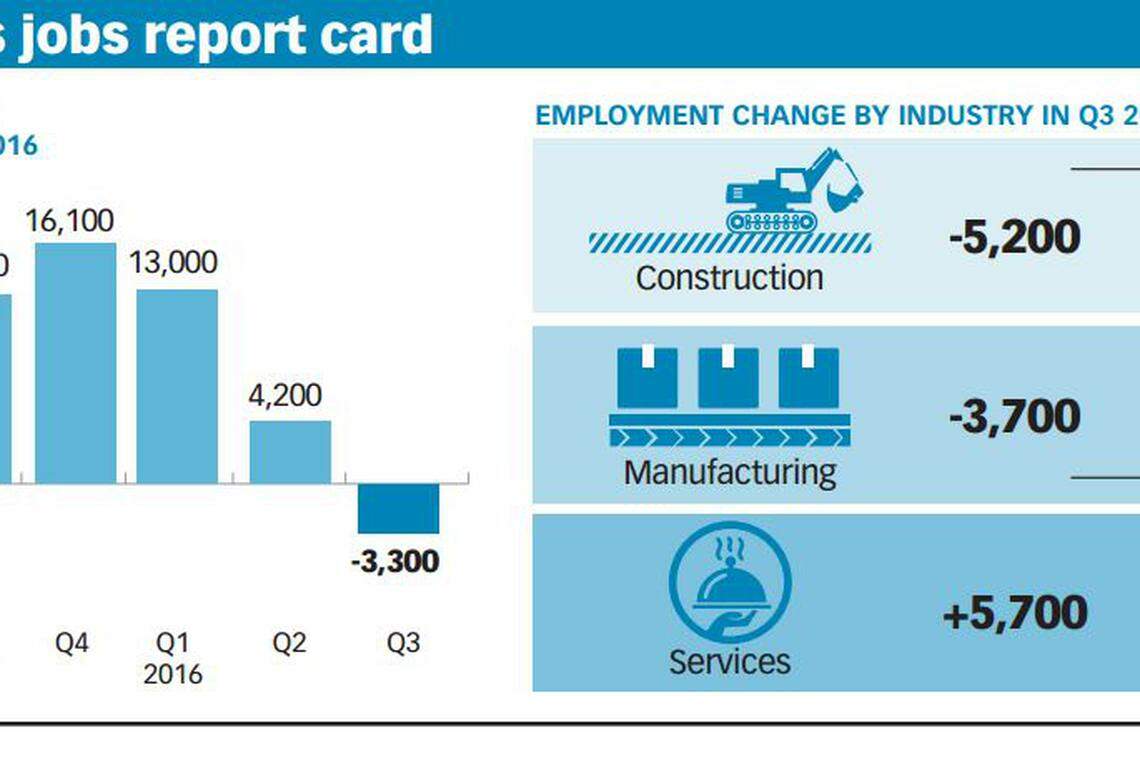Singapore employment dips in Q3 as resident joblessness stays flat
MOM cites slide in construction and manufacturing sectors for fall, affecting mostly work permit holders

Singapore
THE number of employed people in Singapore fell over the July-September period, marking only the second time that total employment has contracted since the 2009 global financial crisis.
According to preliminary estimates released by the Ministry of Manpower (MOM) on Thursday, total employment contracted by 3,300 in the third quarter. This contrasts with growth of 4,200 in Q2, and 12,600 a year ago.
The ministry's Manpower Research and Statistics Department attributed the Q3 fall to contractions in construction and manufacturing, affecting mainly work permit holders.
There was slightly better news on the redundancy front as the number of layoffs dipped in the third quarter to 4,100, down from the 4,800 in Q2.
However, the latest figure is higher than the 3,460 a year ago due to the "subdued global economic conditions and internal economic restructuring", said the report.
The ministry added that the number of layoffs fell in services and manufacturing, but went up for the construction sector. Services, however, accounted for nearly 60 per cent of the total redundancies.
Overall, total employment in Singapore stood at 3.67 million in September. This is just 0.8 per cent higher than a year ago, and lower than the 1.3 per cent growth in June and the average annual growth of about 2 per cent in 2015.

Employment in manufacturing declined for the eighth quarter in a row. The construction sector also experienced a drop after four quarters of moderated increases due to a slowdown in private sector construction activities. Employment growth in services, meanwhile, was slower than the previous quarter.
On a quarter-on-quarter basis, the seasonally adjusted unemployment rate was unchanged at 2.1 per cent in September, compared to June.
Over the same period, the resident unemployment rate (which refers to Singaporeans and permanent residents) remained relatively stable, slipping marginally to 2.9 per cent from 3 per cent.
The rate for citizens was also largely unchanged between the end of the second and third quarters, dropping a notch to 3 per cent from 3.1 per cent.
An estimated 66,500 residents, including 58,500 Singaporeans, were unemployed in September. This was lower than the 68,400 residents and 60,200 citizens in June.
Commenting on the MOM report, economist Selena Ling noted that while the overall unemployment rate was stable at 2.1 per cent, this could change given the "dovish global and domestic growth conditions, and business caution".
Ms Ling, head of treasury research and strategy at OCBC Bank, added that Singapore's labour market would likely see further consolidation heading into the fourth quarter of the year and 2017.
"With external headwinds and sluggish domestic business conditions, hiring intentions and wage growth expectations will have to be adjusted accordingly. Skills upgrading and reskilling efforts, as well as jobs-skills matching initiatives, will play an increasing role ahead to support the softening labour market," she said.
Earlier this week, the Monetary Authority of Singapore (MAS) said in its twice-yearly macroeconomic review that the Singapore economy was going through a cyclical downturn and was not expected to pick up significantly next year.
The global economy is expected to expand at a "steady but still mediocre pace" in 2017, and demand remains uneven across Singapore's main export markets, the central bank said.
Member of Parliament Patrick Tay, who is the assistant secretary-general of the National Trades Union Congress (NTUC), spoke of the need to continue to innovate and transform industries to remain competitive, and to redesign and recreate more quality jobs for Singaporeans.
"The challenge is how to best help Singaporeans made redundant or unemployed to find jobs quickly by tapping the many channels of support," he wrote in a post on his Facebook page.
"(It's) not going to be easy because of the new kinds of jobs and new skills required, and new mindsets needed on the part of both employers and employees. Tripartite partners and society must play our part."
KEYWORDS IN THIS ARTICLE
BT is now on Telegram!
For daily updates on weekdays and specially selected content for the weekend. Subscribe to t.me/BizTimes
International
Axiata, Sinar Mas seek permission for Indonesia telco merger, minister says
Taiwan exports to US jump by record as China shipments fall
Thai PM says cannabis to be re-listed as narcotic by end of 2024
US eyes curbs on China’s access to AI software behind apps like ChatGPT
India growth can top 6.5% for a decade, says economic adviser
Indonesia central bank sees no need for more rate hikes
